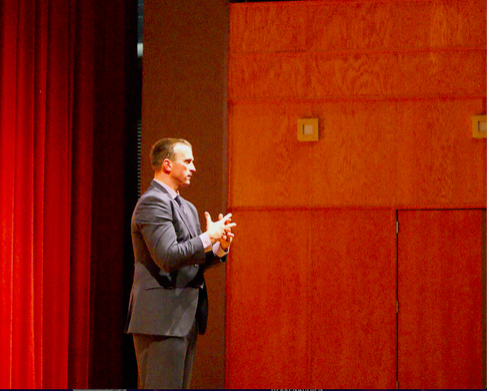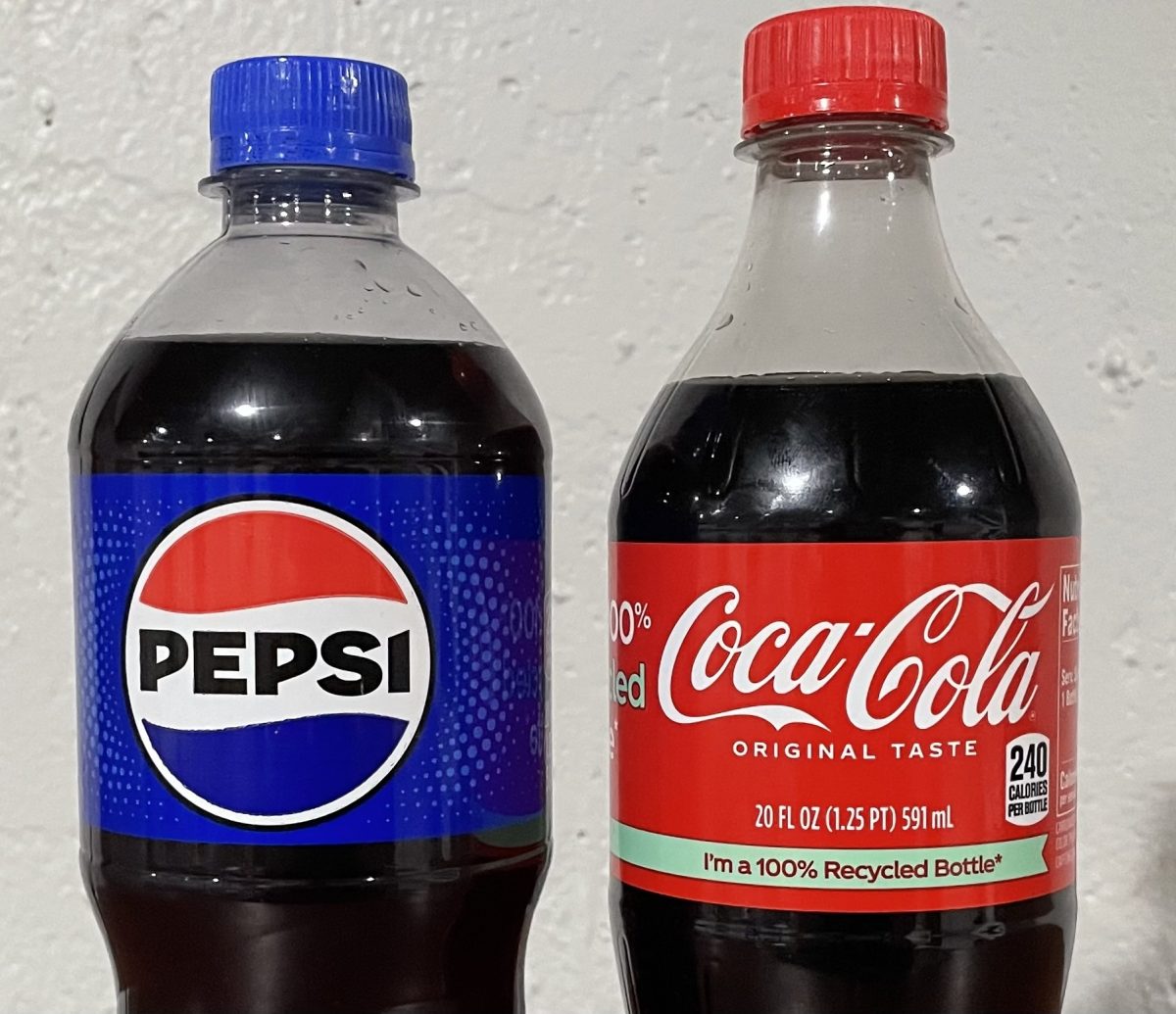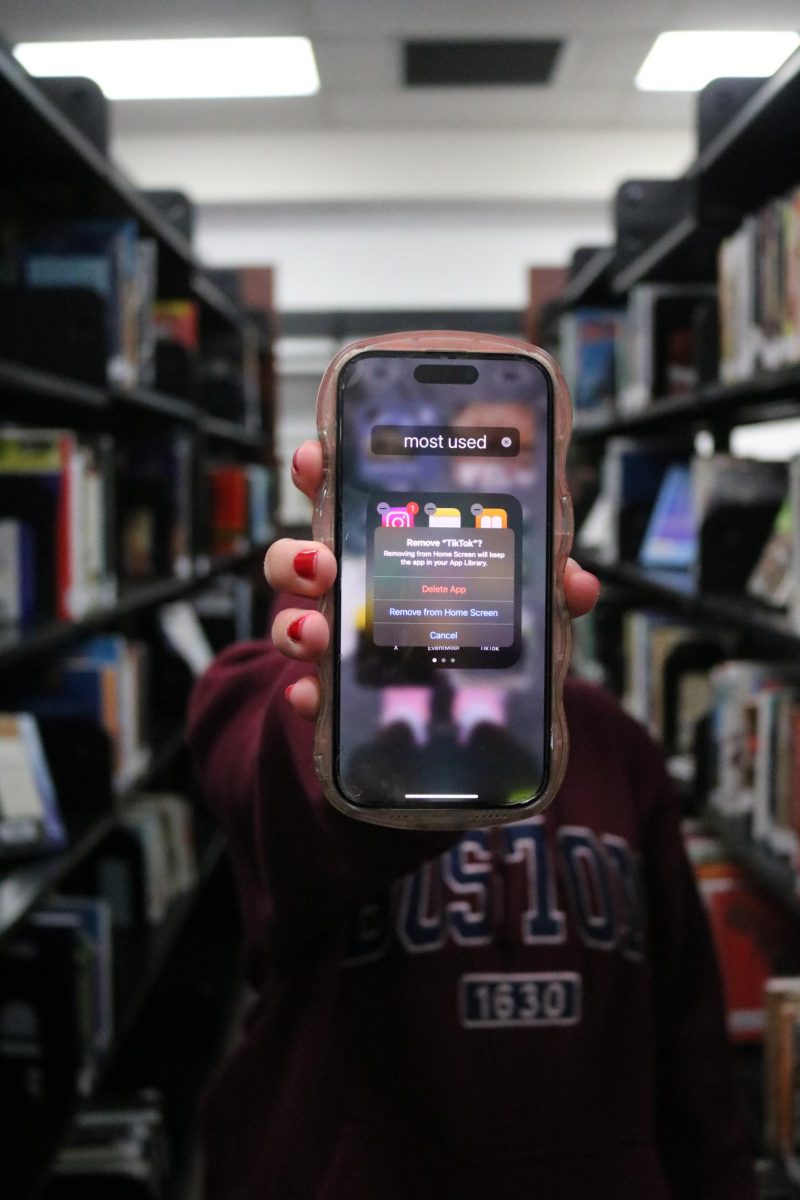
On April 14, the Libertyville and Vernon Hills communities had the chance to hear the words and feel the story of Chris Herren in a tiny, just-under half-full auditorium located at VHHS.
Herren, a former professional basketball player in the NBA as well as overseas, lost his career to substance abuse but has turned his life around and been drug-free since August 1, 2008. He currently travels around the country, vividly sharing his story and speaking with students, adults, and parents, whether they may be promoting a substance-free school, on a professional sports team, recovering themselves, or just members of a school or community.
Herren has found his passion in prevention and has made it his mission to share his experience and his words with others. He does it to get people to talk; he wants kids to wake up and know they can be better. However, it was not something he planned to do and it’s definitely not an easy task.
“Public speaking for me happened by accident. This is not something that comes easy. It’s a very personal story and not just personal for me, [it’s] personal for people who are in attendance, whether it’s at schools or community events,” shared Herren after the event.
VHHS’s SAP Coordinator, Mrs. Amy Dillon shared her thoughts on the presentation as well as why she felt it was beneficial to bring Chris to the community.
“Chris shared his struggles with substance abuse and how he continues to work on his sobriety every day. Chris is very open about his substance abuse and I feel like we got a very personal look at his life and the struggles he and his family faced as a result of his choices. Although it must be painful for Chris to share what he has done, he was very open and honest about the poor choices he made in his life and how that impact not only his own future but his family’s, stated Mrs. Dillon.” “His story is meant to inspire the audience, get people thinking, empower parents and community members to take action, and hopefully prevent one more person from using substances. Prevention is very important to D128 and our community and we hope that bringing Chris to our community made an impact and helped raise awareness.”
While the presentation was centered around Herren’s story and his recovery in order “to change the life of at least one person” in the crowd, it also highlighted life and love. The presentation reached out to people to find the reason for their downfall and realize it’s never too late to make a change.
The presentation opened with a five-minute video that included the highlights of his career, ending with his downfall.
After a moment of silence and complete darkness due to the completion of the video, Herren took to the stage.
From the moment Herren spoke on stage, the atmosphere of the room became heavy; there was a sense of humanity in the room, a sense of life that seemed to connect everyone in the room no matter who they were or why they were there.
“Every event is different, but it brings out a certain passion because of the people that are there. Prevention for me is—I will be honest with you, a lot of people hire me to come in to tell my story. I’m better at telling my story because I’ve done it so many times, but I just don’t think it’s enough. I don’t think it’s effective enough for kids because I don’t think a little kid is gonna walk out and say like I did in the beginning and say ‘I’m gonna shoot heroin when I get older.’ I think you have to make it personal in prevention. I think you have to ask yourself where you’re really at in your life and I think from there you can really make…progress,” explained Herren.
Throughout the presentation, Herren didn’t stray from discussing personal matters about himself and his family and how both were affected. He spoke personally about his childhood and the progression of his addiction from the high school years to his professional career, including people he encountered along the way.
In addition, he spoke of people that he has met through doing these presentations, stories that were tough to hear at times, but also very touching.
He recalled the time when a girl at one of these presentations, who was wearing a purple shirt, stood up against substance abuse and was laughed at by her peers, adding how sad he thought it was. According to Herren, this girl prompted the Project Purple, a part of the Chris Herren Project that aims towards raising a sober culture and raising awareness in general.
This honesty is what arguably made the presentation special and worthwhile compared to an impersonal lecture on drug abuse or just simply one person’s story, something Herren felt needed was essential to the presentation.
“I can’t even tell you or begin to explain some of the emails I get…I’ve sat in offices with kids and heard things that I could have never imagined in my life, but I believe that me going to the school and being able to be honest and open allows those kids to take a chance on themselves,” reflected Herren.
The main question that Herren referred to in relation to his own life, the lives he’s previously spoke in front of, as well as those in attendance at VHHS, was, “Why do I need to change myself on Friday nights?” While it may seem like a simple question, it was one that shook the audience.
“When I ask kids, ‘how come on Friday and Saturday nights you can’t be yourself?’ there’s a lot of kids that put their head down, and that’s emotional for me because they’re at the same stage that I was at,” explained Herren.
This question is something that Herren believes many kids struggle with answering and something that people often cannot pinpoint the exact answer to.
It’s a question of why using substances is necessary to have a good time, why it is necessary for someone to sit in their friend’s basement or to go to football games under the influence.
Herron, a father himself, emphasized the importance of this question and actually addressing and talking about it. He stressed that doing drugs and alcohol should not be considered a normal part of growing up, or the adolescent experience in particular, in his opinion.
“I just think it’s important to promote wellness. I think like going to a football game drunk isn’t cool, like I don’t care what anybody says, to me, that’s not cool. I don’t think it’s cool getting wasted going to your junior prom or your senior prom. I know for some people that’s hard to hear, but I want my son to be able to do without [it]. And I think that’s what we should aim for rather than accepting some will, some won’t. I think we should be promoting and aiming that all of our kids feel good enough, at 15, at 16, that drugs and alcohol aren’t necessary,” he explained.
He later stated that many kids do not feel comfortable talking about their problems or situation, as it is not an easy thing to do.
“I just think it’s sad that we don’t give kids more of an opportunity to talk. You know, it’s like we drop the kids off at school and it’s geometry or algebra, it’s history, it’s science, it’s sports after school and it’s like now go home and repeat it again. The last time I checked, I’ve never heard a kid raise their hand and say, ‘I’ve been cutting myself for two years’ in biology. It’s not a place or a platform where they feel comfortable doing that. Now if we had more classes and offered that, that comfort zone, kids would talk,” explained Herren. “I spoke at a very affluent prep school called Annapolis Prep, it’s where all the Navy officers’ kids go, right by the Naval Academy and [it’s a] very affluent area and [the] tradition is to shake every kid’s hand. And as the line’s coming and I’m shaking hands, I see a little girl, like four girls back and she’s crying, but she’s wiping her tears really fast and I could tell that she was trying to hide the tears. And she walked up to me and said, ‘Can I talk to you, but not here, I can’t get embarrassed in front of my friends?’ So I said ‘No worries, go to to the library, I’ll see you there when I’m finished.’ By the time I got through the line, there was 45 kids in the library. They were all sitting a table…and they were all crying and laughing, having no idea what their struggle was. Those kids were sitting in classrooms together, some with broken hearts and having no idea that the kid three seats over was struggling with the same exact thing they were struggling with, but if we offered that, you’d find a friend. You’d identify with somebody who kinda had the same background you did and then I think you’d have an opportunity to be better and get better with that.”
At the conclusion of the presentation, Herren welcomed the audience in to ask him questions.
“When I go to affluent schools, kids won’t even raise their hands and ask a question because they don’t want their parents to hear that they asked a question at the drug assembly and when they walk out of the drug assembly, they don’t want their friends to judge them. You kids are afraid to ask questions in communities like this because of image,” he later reflected.
In an honest and personal matter, Herren was able to carry the audience through his own story, but more importantly, to reach out to members in the crowd on an emotional level; for one night, everyone was merely a human being.
Herren spoke of some of the pressures he believes kids today deal with.
“I think parents put pressure on kids to get academic scholarships. College is so expensive today that I think kids hear that and know that and that’s part of it, that they have to work really hard to take that burden off their parents. Social media is an immense amount of pressure. You kind of always have to look right, feel right, be right today because you don’t know if someone’s taking a picture of you, what’s gonna be going on and I think that’s a lot to ask of kids. So I think today and [with] today’s kids, there’s a lot more pressure and I wish that they didn’t have to deal with that. After—you know with everything I’ve gone through with my life, I wouldn’t want to say I’ll start over in your generation,” he said.
Despite the difficulties and pressures, however, Herren believes each day is a new day for improvement and that it’s important to keep on trying. It’s important for one to find their happiness and be able to say “I am enough, just the way I am.”
“For six and a half years, I felt I was enough…for six and a half years, my kids have had the same thought,” stated Herren.
Not many people from the community were in attendance. The auditorium was nowhere near its full capacity.
“It’s really sad how little people showed up,” stated Herren during the presentation.
For more information about the Chris Herren Project, visit http://www.theherrenproject.org.







Sandy • Mar 14, 2018 at 7:01 pm
Right. Few from the community came with their kids so that they might learn from this mans experience, but they certainly supported the political walkout for guns. This would have been a much more constructive use of time and actually is part of the broader conversation as it pertains to our teens and mental health.